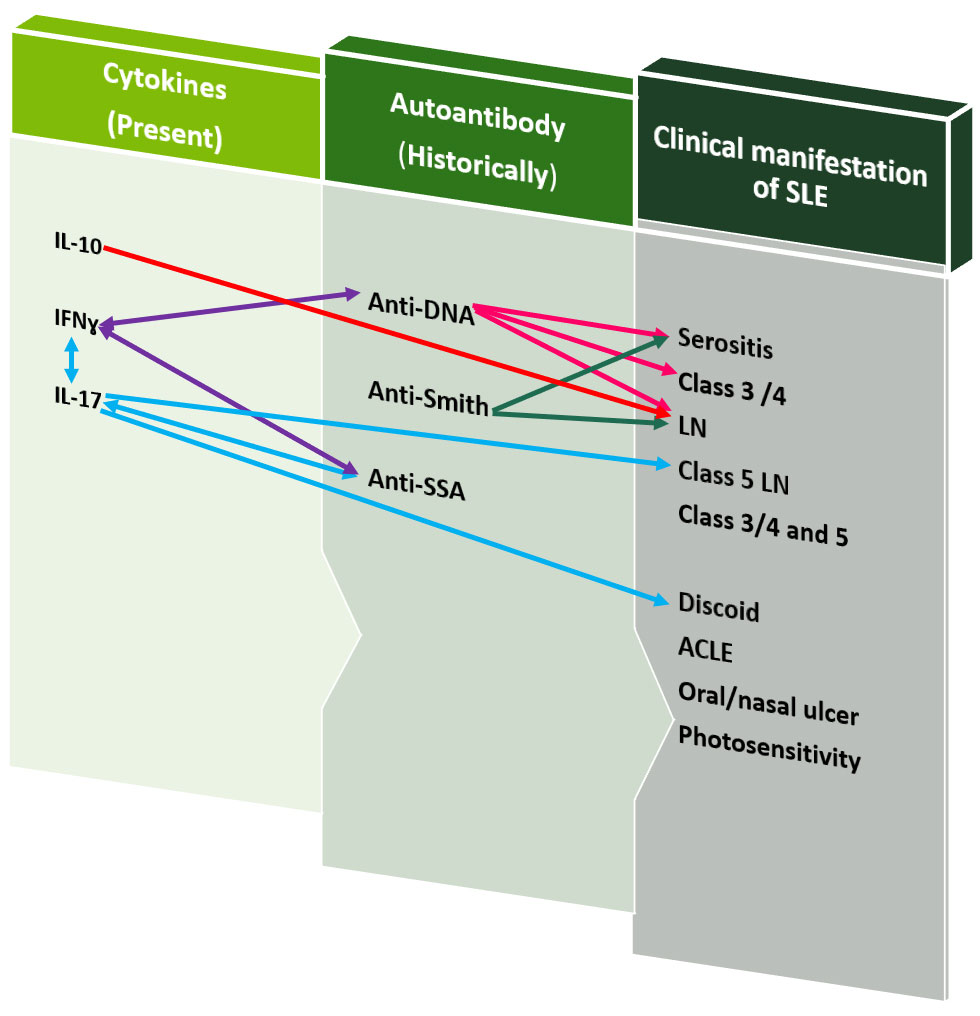Session Information
Date: Sunday, November 13, 2022
Title: SLE – Diagnosis, Manifestations, and Outcomes Poster II: Manifestations
Session Type: Poster Session C
Session Time: 1:00PM-3:00PM
Background/Purpose: To determine if different classes of lupus nephritis (LN) are correlated with specific circulating autoantibodies (autoAbs) and T-helper cell cytokines and other manifestations of systemic lupus erythematosus (SLE).
Methods: All patients (N=62) met the SLE classification criteria of the American College of Rheumatology/European League Against Rheumatism (ACR/EULAR) or Systemic Lupus International Collaborating Clinics (SLICC) classification criteria. Demographic and clinical data were included. Plasma levels of interferon gamma (IFNɣ), interleukin 17 (IL-17), interleukin 10 (IL-10), as well as isotype-specific (IgG) anti-DNA, anti-Ro/SSA (SSA), and anti-Sm were measured using an enzyme-linked immunosorbent assay (ELISA).
Results: The most common manifestations were a history of arthritis in 61% (N=38), photosensitivity rash in 53% (N=33), LN in 44% (N=27), and oral/nasal ulcer in 31% (N=19) SLE patients. AutoAbs (anti-DNA, anti-SSA, and anti-Sm), IFNɣ, and IL-17, but not IL-10, were significantly elevated in SLE patients compared to healthy controls. There were elevated plasma levels of anti-DNA (p = 0.0101) and anti-Sm (p = 0.0499) in patients with a history of LN compared to patients without LN. In contrast, plasma levels of anti-Sm were decreased in patients who had a history of acute mucocutaneous manifestations, including photosensitivity rash and/or malar rash (p = 0.0152). Among the three cytokines that were analyzed, IL-10 was significantly elevated in patients with a history of LN compared to patients without LN (p = 0.0216). IL-17 was positively correlated with anti-SSA (p = 0.0130) and was significantly higher in patients with discoid rash (p = 0.0238) and history of class V LN (p = 0.0055). IFNɣ was positively correlated with anti-DNA (p = 0.0355) and anti-SSA (p = 0.0402).
Conclusion: This cross-sectional study supports the role of different T-helper cell cytokines that may be associated with the development of different autoAbs in influencing the diversity of SLE clinical manifestations (Fig. 1). The results suggest that elevated IFNɣ and IL-17 are more generalized features in SLE patients. In contrast, higher levels of IL-10 were observed in patients with a history of LN. These results provide insights into the pathogenesis of LN that can help guide future diagnosis and therapies.
To cite this abstract in AMA style:
Alduraibi F, Sullivan K, Chatham W, Hsu H, Mountz J. Interrelation of T-cell Cytokines and Autoantibodies in Lupus Nephritis: A Cross-sectional Study [abstract]. Arthritis Rheumatol. 2022; 74 (suppl 9). https://acrabstracts.org/abstract/interrelation-of-t-cell-cytokines-and-autoantibodies-in-lupus-nephritis-a-cross-sectional-study/. Accessed .« Back to ACR Convergence 2022
ACR Meeting Abstracts - https://acrabstracts.org/abstract/interrelation-of-t-cell-cytokines-and-autoantibodies-in-lupus-nephritis-a-cross-sectional-study/

